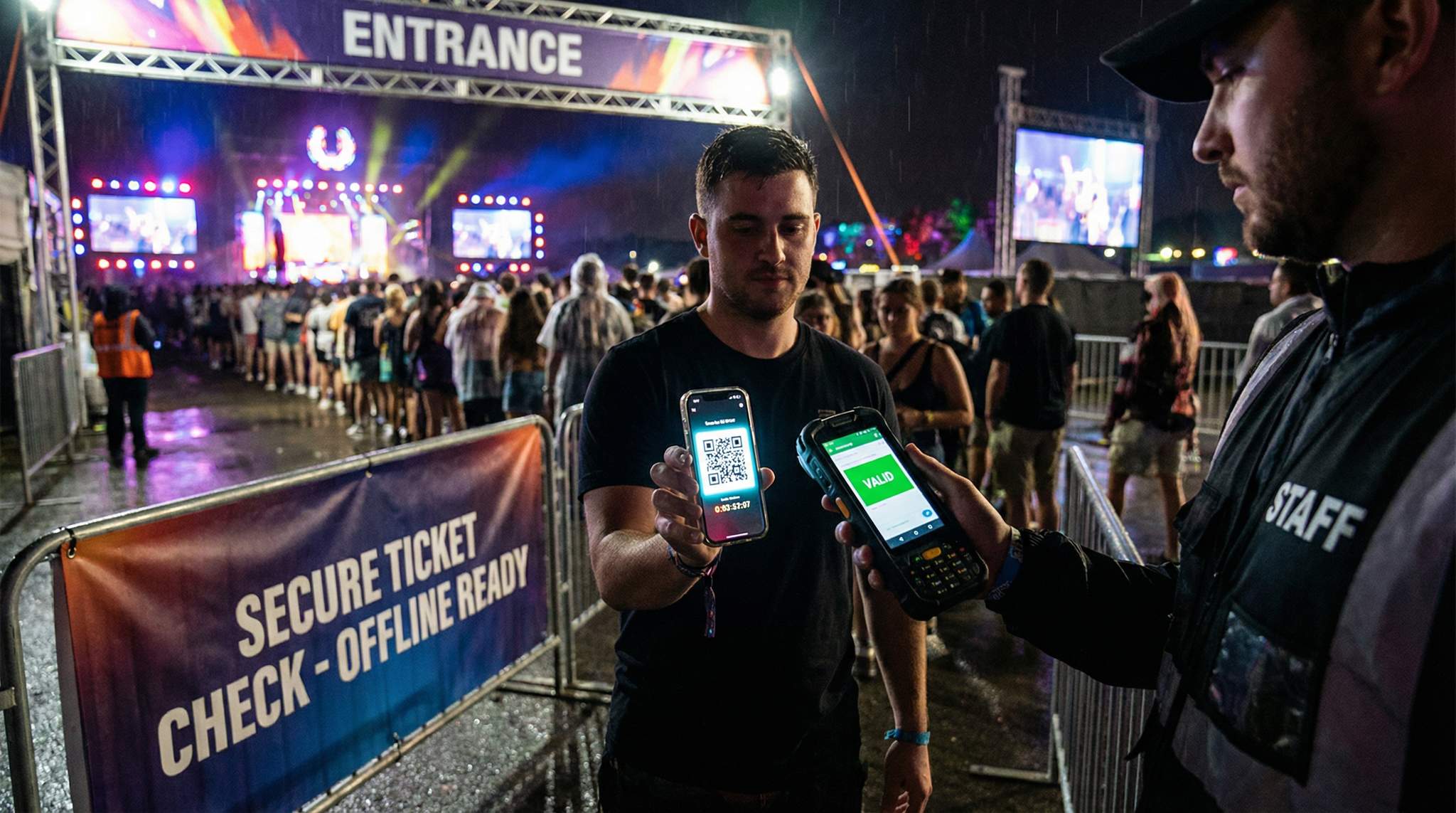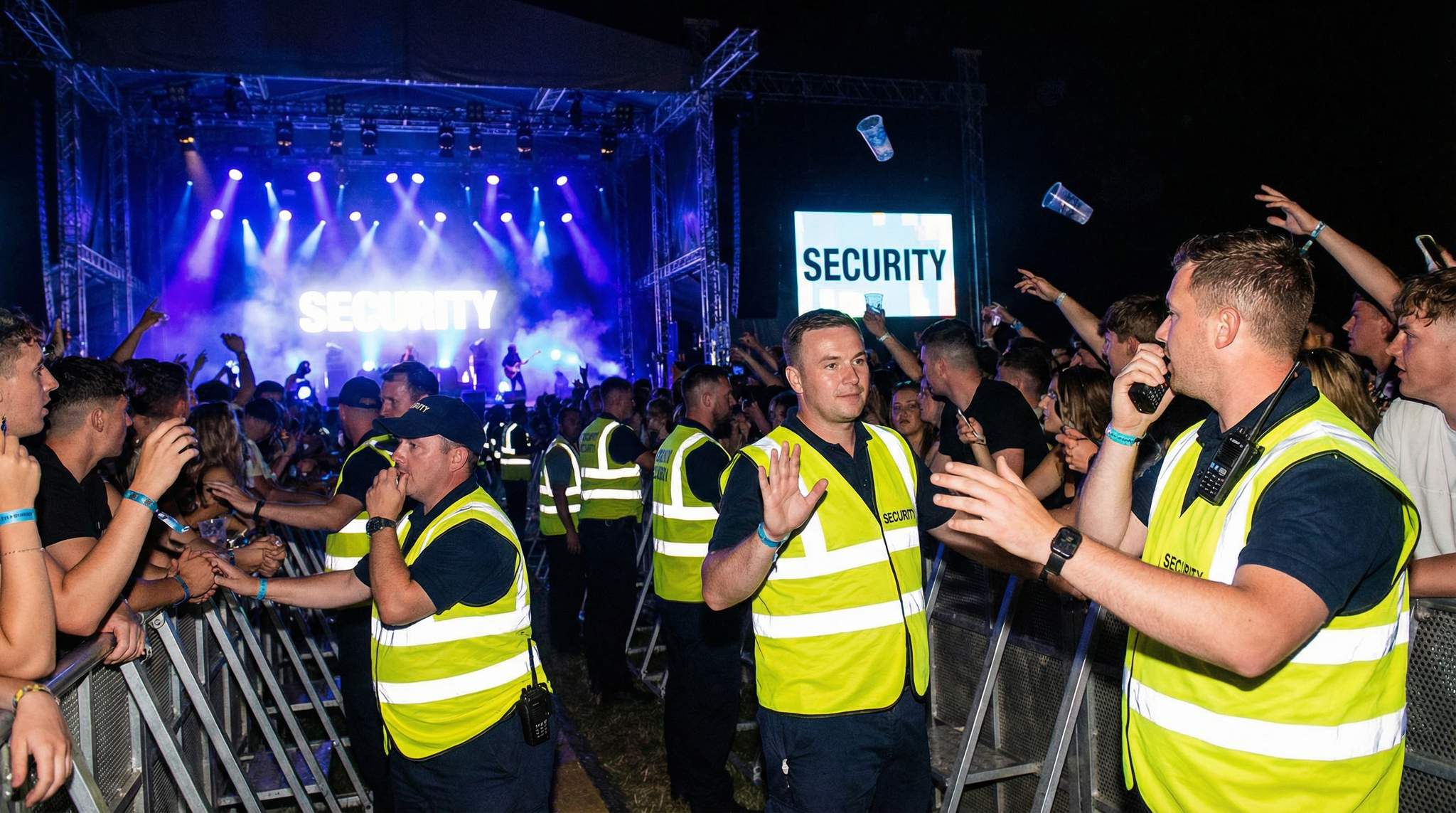In the world of festivals, few things can sour an event’s success like ticket fraud. For festival producers worldwide, dealing with counterfeit or unauthorized tickets isn’t just about lost revenue—it’s about safety, trust, and the fan experience. An oversold or gate-crashed event can lead to dangerous overcrowding and long delays at the entrance, casting a shadow over what should be a joyful occasion. This is why robust anti-fraud ticketing practices have become a top priority, whether the festival is a small local gathering or a massive international event. Some legendary festival organisers have gone to great lengths to curb ticket fraud – Michael Eavis of Glastonbury famously introduced personalised photo-ID tickets to deter scalpers – but today, technology offers even more tools to keep events secure.
Outdoor festivals held in fields or remote locations face an extra layer of challenges when combating ticket scams. Unlike urban venues, these field locations often suffer from spotty internet connectivity, making real-time ticket verification tricky. Crowds at such events can range from music-loving families with kids to die-hard fans, all of whom expect quick and hassle-free entry. Balancing strict security with smooth operations is critical—festival-goers need to feel the system is efficient and fair, not draconian. Ultimately, maintaining a clean ticketing system isn’t just about stopping fraud; it’s about protecting the trust between festival organisers and their community of attendees.
Timed Barcodes: Dynamic Defenses Against Duplicates
One modern solution to ticket fraud is the use of timed or dynamic barcodes on tickets. Instead of a static barcode that could be copied, these digital tickets display a QR code that refreshes every few seconds or minutes. This means that even if someone screenshots their ticket and tries to share it or sell copies, that image will be useless by the time another person attempts to use it. The legitimate ticket on the original buyer’s phone will have a new code, and only that up-to-date code will scan as valid.
Many major festivals and sports events have adopted this approach to stay ahead of scammers. For example, some high-profile stadium concerts now send tickets to mobile apps that show a rotating barcode; when fans arrive at the gate, security scans the live code from the app. If a scammer has sold duplicates of that ticket, those copies won’t work because the code they have is outdated. This adds a strong layer of defense against the classic “print-screen-and-sell” scam that has plagued events for years.
To implement timed barcodes effectively at a festival, organisers should ensure attendees use an official mobile ticket app or digital wallet that supports these refreshable codes. Communication is key: let ticket holders know they may need internet access at the gate or that they should open the app just before arrival to get the latest code. If your festival is in a location with poor connectivity, consider alternatives like cryptographic offline QR codes – codes that are generated with an encrypted timestamp that scanning devices can verify without needing continuous internet. The technology can be complex, but platforms like Ticket Fairy include secure verification methods to make this seamless. The bottom line is that dynamic barcodes greatly reduce the window of opportunity for any would-be fraudster to exploit a copied ticket.
Device Fingerprinting: Unique Digital Signatures for Tickets
Another powerful anti-fraud tool is device fingerprinting – a technique to uniquely identify the devices or accounts interacting with your tickets. In practice, this can mean tying each ticket to a specific user account or smartphone. If a ticket’s QR code or PDF is copied and someone tries to use it on a different device or in an unrecognized app, the system can flag this discrepancy. For example, an attendee might be required to download their mobile ticket through an official festival app or ticket wallet that logs the device ID. Should that ticket suddenly appear on another device elsewhere, it could be a sign of a shared or duplicated ticket, triggering additional verification (like prompting for the buyer’s ID at the gate).
Planning a Festival?
Ticket Fairy's festival ticketing platform handles multi-day passes, RFID wristbands, and complex festival operations.
Device fingerprinting also helps on the ticket purchasing side. It can detect when a single person or bot tries to buy many tickets from the same device or IP address, which is a common tactic in ticket scalping. By catching these patterns, festival organisers can cancel fraudulent orders before those tickets ever reach the secondary market. Some large events in India and Singapore, for instance, have started implementing such checks to curb bulk buying by scalpers, and it’s made a noticeable difference in reducing counterfeit tickets showing up later.
When implementing device or account-level tracking, transparency is key. Make sure your privacy policy covers how you use this data, and communicate to genuine buyers that these measures are in place to protect their purchase. From the organisers’ perspective, having a log of which device scanned which ticket (and when) can be invaluable for investigating any issues. It also ensures that only authorised scanning devices (whether it’s smartphones running your ticketing app or dedicated scanners) can validate tickets. This way, no rogue device can arbitrarily mark tickets as used. All these precautions build a digital fingerprint for every legitimate entry, making it significantly harder for a fraudster to slip through unnoticed.
Offline Scanners: Prepared for Connectivity Outages
Field festivals often take place far from reliable Wi-Fi or cellular service. Even at well-connected venues, the sheer number of attendees can overwhelm networks. That’s why having offline-capable ticket scanners is absolutely essential. An offline scanner (whether a handheld device or a smartphone with the right app) can validate tickets against locally stored data or using cryptographic validation, even when disconnected from the internet. Each scan is logged, and once the device regains connectivity, it syncs with the central system to update the list of used tickets. This ensures that if the same ticket is presented at another gate, those other scanners will know it was already used.
Major festivals have learned the importance of this the hard way. At a UK music festival in 2019, for example, network issues at the wristband validation gates caused huge delays, with frustrated crowds waiting for hours because the scanning system couldn’t connect to the database. Some attendees even broke through barriers in the chaos. To avoid such nightmares, festivals like Glastonbury (UK) and Stagecoach (USA) equip their entrances with scanners and software that can operate offline. Stagecoach – one of the largest country music festivals, held on a sprawling desert field – utilises RFID wristbands and offline verification so check-in keeps moving even if the cell towers get jammed. The lesson: always have a plan for when (not if) connectivity drops.
To implement offline scanning, work with a ticketing provider that supports it (for instance, Ticket Fairy’s scanning app is designed to work both online and offline). Test everything before gates open: simulate a network outage during a trial run to see if your devices still catch invalid or duplicate tickets. Also, ensure you have enough scanning devices to cover peak entry times, plus backups charging and ready to swap in. If you expect thousands of attendees, a few smartphones won’t cut it – you may need dozens of devices across all entrances, all synced with the latest ticket data. By planning for offline operation, you’re protecting your festival from technology hiccups and keeping the welcome experience smooth, rain or shine, signal or no signal.
Dedicated Lanes for Staff and Ticket Issues
It’s a smart move to separate your staff/credential entry and problem-ticket lanes from the general admission lanes. Festival staff, vendors, and artists often have special passes or wristbands that need verification – these can take longer to process if, say, a name isn’t on the list or a credential chip isn’t activating. You don’t want families with excited kids or regular ticket holders waiting behind a complicated credential issue at the main gate. By giving staff and production crew their own entrance (or at least a dedicated lane), you can sort out any ID checks or pass problems away from the public flow.
Need Festival Funding?
Get the capital you need to book headliners, secure venues, and scale your festival production.
Likewise, have a clear procedure for handling any ticket that triggers an “invalid” or “already scanned” alert at the gate. Rather than arguing with the attendee on the spot or halting the line, gate staff should politely direct them to a nearby resolution tent or help desk. There, a trained customer service team can investigate the ticket: Was it bought from an unauthorized reseller? Is it a duplicate? Often the person holding a fake ticket is an innocent victim of a scam, so this needs handling with empathy. For example, CMA Fest in Nashville stations customer support staff at the entry points specifically to handle ticketing snags; if a fan has an issue, they’re pulled aside calmly and the main line keeps moving. This approach keeps the majority of attendees smiling and entering smoothly, while those with problems get more focused attention (and aren’t made to feel like they’re on display). Clear signage and staff guidance will help everyone know where to go, minimizing confusion at the gates.
Nightly Reconciliation and Anomaly Investigation
For multi-day festivals, the job of fraud prevention continues even after the gates close each day. It’s crucial to reconcile your ticket scans nightly and investigate any anomalies. Modern ticketing systems will log every scan (successful or denied), giving festival organisers a goldmine of data to review each evening. Have your team run reports on how many tickets were scanned vs. how many were sold or expected that day. If those numbers don’t line up, you need to find out why.
What should you look for in these reports? Here are a few red flags to investigate:
- Duplicate Scans: Did the system log any ticket ID being scanned twice (or more)? If so, was the second attempt allowed or flagged as invalid? A duplicate scan attempt could mean someone tried to reuse a ticket or use a counterfeit copy.
- Invalid Entry Attempts: How many tickets were denied at the gate for being invalid? A cluster of invalid attempts might indicate a batch of fake tickets in circulation (for example, if many people bought from the same scam website).
- Discrepancies in Count: Do the total scans match the attendance you expected? If more tickets are scanning than were sold, you might have gatecrashers or counterfeit tickets slipping in. If fewer, perhaps some people haven’t arrived yet or there’s a scanning issue to correct.
- Problem Gate Patterns: See if one entry gate had more problems than others. If Gate A saw 20 invalid scans and Gate B saw 0, something might be up at Gate A (maybe a lax staff member or targeted fraud at that entrance).
By combing through these details daily, you can catch issues early and respond. For example, at a Canadian country music festival, organisers discovered through nightly reconciliation that five VIP tickets had been scanned twice on the first day. They quickly traced this to a single scammer who had sold duplicated VIP e-tickets online. Armed with this information, the team alerted gate staff to be on the lookout for those duplicate codes on Day 2 and issued a warning to attendees about fake tickets circulating. This proactive approach prevented a handful of disappointed fans from becoming a flood on the following days.
In addition to catching fraud, nightly audits help with operational accuracy. It confirms that your attendance numbers are solid and that your entry process is functioning as intended. If any scanning devices failed to upload their data due to being offline, you’ll catch that and can sync them or fix the issue by the next day. Essentially, reconciliation is your opportunity to learn and adapt in real time during the festival, keeping you one step ahead of any ticketing trickery.
Clear Communication with Attendees
High-tech defenses are only effective if your audience understands them. It’s important to communicate your ticketing procedures clearly and confidently to attendees, without causing unnecessary alarm. Well before the festival, let ticket holders know what to expect at the gates. For example, if you’re using dynamic QR codes, you might instruct attendees to download the festival’s official ticket app and ensure their tickets are loaded there. If tickets are personalised or ID checks will be in place (common for some VIP or age-restricted entries), remind people to bring proper identification. Emphasise the positive: “These measures are here to protect you from fraud and get you into the venue faster.” By framing security steps as benefits (speed, safety, fairness), attendees are more likely to cooperate happily.
On-site, make sure signage and staff announcements reinforce these messages in a friendly way. Train your gate staff and volunteers on how to handle ticket issues with empathy and discretion. If someone is stopped with an invalid ticket, it’s often not malicious—many times they’ve been duped by a scam. Instead of treating them like a criminal, staff can calmly explain the situation and guide them to the help desk for assistance. This approach was exemplified by Tomorrowland in Belgium: when thousands of counterfeit tickets were found in circulation a few years back, Tomorrowland’s organisers didn’t chastise the victims at the gate. They set up dedicated support lines to explain and help, and widely publicised advice on avoiding fraud for future editions. The key is to educate without scaring. Let your fans know that the festival has strong security in place and that by following official channels and guidelines, they’ll have a smooth experience. When people see that you’re proactive about fraud and also respectful toward fans, it builds trust. They’ll be more likely to buy tickets through legitimate means next time and spread the word that your festival is well-run and customer-focused.
Clean Systems Protect Trust
The integrity of your ticketing system directly affects your festival’s reputation. Fans need to trust that when they buy a ticket, it will get them in without a hitch, and that the event won’t be dangerously oversold by fraudsters sneaking in extra people. By using tools like timed barcodes, device fingerprinting, and offline-ready scanners, festival teams can dramatically reduce the opportunity for ticket scams. The result is more than just preventing lost revenue – it’s creating a safer and more enjoyable experience for everyone on-site.
Successful festivals, whether it’s a local folk gathering or a massive country music mega-fest, treat ticket security as a top priority. It’s as fundamental to the event’s success as great artists, good sound, and clean amenities. A venue that is free of counterfeit tickets is a venue where crowd size is as expected, resources (like water, food, and space) are sufficient, and emergency services can accurately account for attendees. In short, a clean ticketing system keeps the festival experience fair and secure. It also sends a message: this festival cares about its community and runs a professional operation.
As technology continues to evolve – from RFID wristbands to potential biometric check-ins – the core principle remains the same: stay one step ahead of those who would abuse the system. By implementing the measures discussed above, festival organisers not only fight fraud effectively but also uphold the trust that keeps fans returning year after year. In the end, protecting your attendees from ticket scams is part of taking care of them, just like great music and safe facilities. And when fans feel taken care of, they’ll reward you with loyalty, glowing reviews, and a vibrant, sold-out festival for years to come.





